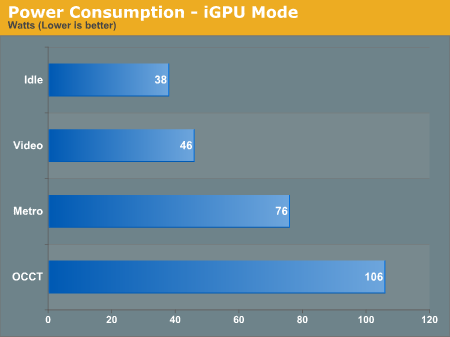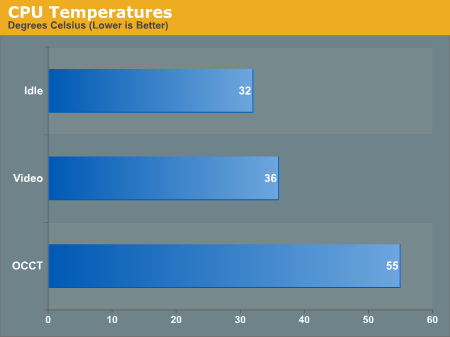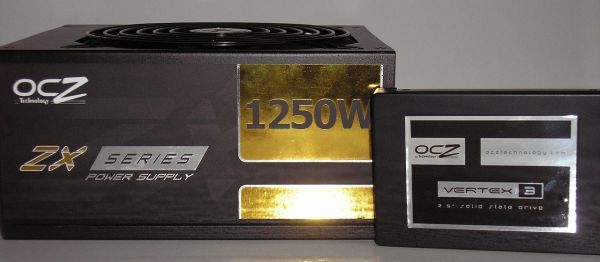Gigabyte Z68X-UD3H-B3 Review
by Brendan van Varik on July 11, 2011 7:01 AM EST- Posted in
- Gigabyte
- Motherboards
- Sandy Bridge
- Z68
Test Setup
| Processor |
Intel Core i5 2500K ES 4 cores, 4 threads, 6MB L3 |
| Motherboards | Gigabyte Z68X-UD3H-B3 ($170) |
| Cooling | Thermalright Ultra 120 eXtreme with one 120MM fan |
| Power Supply |
Silverstone 1000W Silver (Power Testing) OCZ ZX Series 1250w 80 PLUS Gold |
| Memory | Patriot Viper Extreme DDR3-2000MHz 9-11-9-27 2x4GB - 1.65v |
| Memory Settings | DDR3-1333MHz - 9-9-9-24 1T at 1.65v |
| Video Cards | XFX HD 5850 1GB |
| Video Drivers | Catalyst 10.12 |
| Hard Drive | OCZ Vertex 3 240GB |
| Optical Drive | Samsung SH-S223Q |
| Case | Dimastech Bench Table |
| Operating System | Windows 7 64-bit |
| SATA Testing |
OCZ Vertex 3 240GB Micron C300 |
| USB 2/3 Testing | Patriot 64GB SuperSonic USB 3.0 |
Before we go any further, I’d like to take the time to thank OCZ for making this review as well as future reviews possible – OCZ provided a ZX series 1250w Gold rated PSU (retails at $240) and a Vertex 3 240GB SSD (retails at $560).
Comparison to Previous Results
Where applicable, the results in this review are directly compared to the following chipsets and boards which we have reviewed previously:
Power Consumption
Power consumption was tested on the system as a whole with a wall meter connected to the power supply, while in a dual GPU configuration. This method allows us to compare the power management of the UEFI and the board to supply components with power under load, and includes typical PSU losses due to efficiency. These are the real world values that consumers may expect from a typical system (minus the monitor) using this motherboard.

As this is my first review for AnandTech, Ian hasn't run any tests using his OCZ 1250W power supply yet, making any tests he has previously done with an older power supply not comparable to this motherboard.
CPU Temperatures

In a similar situation, Ian and I have different cooling setups (he is using a H50, I'm using a TRUE) for now, so I cannot compare these results to others and draw justifiable conclusions.











70 Comments
View All Comments
DBissett - Monday, July 11, 2011 - link
What is it with using plural verbs following "Gigabyte", as in "Gigabyte have...." and "Gigabyte do....". This sounds atrocious in an otherwise well written article. Verbs should be "Gigabyte has...." and "Gigabyte does...." because "Gigabyte" is a singular noun. Where's the editor?LtGoonRush - Monday, July 11, 2011 - link
Corporations are treated as plural nouns in most English-speaking countries.Death666Angel - Monday, July 11, 2011 - link
Then Anandtech isn't being consistent, because they treat Apple, for example, as a singular entity, see iPad2 and iOS 4.3 reviews ("Apple has...").As a non native English speaker, I agree with DBissett, reading "Gigabyte have..." is not very intuitive and distracts.
Otherwise, nice article. I'm still using a i7 860 and a AMD 5770 and will use those until the 28nm GFX and 22nm CPUs are around.
Snotling - Monday, July 11, 2011 - link
I noticed it too, but "an SSD" is just as bad... its "a SSD"Exodus220 - Monday, July 11, 2011 - link
Actually, you would be incorrect in stating that it should be written "a SSD." The usage of "a" vs "an" is in regards to the beginning vowel sound of a word, not if it begins with a vowel. Since SSD begins with an "es" vowel sound it requires "an" placed before it. Thus, "an SSD" is 100% correct.awaken688 - Monday, July 11, 2011 - link
Yep. 100% correct.roboray - Monday, July 11, 2011 - link
"As a non native English speaker, I agree with DBissett, reading "Gigabyte have..." is not very intuitive and distracts."As a native English speaker, I agree as well. I can count on my fingers the number of times I have seen corporations treated as plural nouns, and it's always a distraction. It makes me suspect that the editor is someone who got their Master's in English without having actually used the language much for anything other than a topic of study. "Proper" or not, it's not common practice, at least in the US.
Jambe - Monday, July 11, 2011 - link
Get over yourself.I like to go all Grammar Nazi from time to time myself, but seriously. This is a trifle.
joshv - Wednesday, July 13, 2011 - link
This is standard British usage. It's just different, it's not incorrect. You will rarely encounter it in writing by American writers, though the British usage is starting to make some beachheads. It's not at all clear to me that or the other way is more proper or correct. The British just interpret corporate entities as representing multiple people - thus plural.DBissett - Monday, July 11, 2011 - link
I disagree. I've been writing in the US for 50 years and the use of singular verbs with corporate names has only recently begun to creep into otherwise good writing. Check any publication you like. Further, AT is very inconsistent in this regard both between and within articles. The responder below points this out. Also, look in this article's summary, where Gigabyte is used with a mixture of singular and plural verbs.